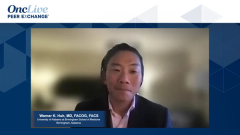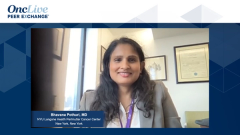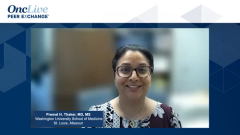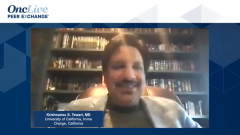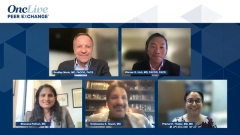
Role of HPV Vaccination and Screening to Prevent Cervical Cancer
A comprehensive review of the current paradigm for HPV vaccination and screening to prevent cervical cancer.
Episodes in this series

Transcript:
Bradley Monk, MD, FACOG, FACS: Dr. Thaker, you’ve been a passioned advocate for all levels of special populations. This is a preventable disease. We live now in the pandemic and vaccination is important. What’s the role of vaccination in preventing what Dr. Pothuri said, a virally-induced cancer? Tell us about that.
Premal H. Thaker, MD, MS: It’s critical to know that we’ve had an HPV [human papillomavirus] vaccine that’s been approved since 2006. I wish the United States was as great as other countries have been in vaccination, but we’re catching up slowly. There’s critical work done by the CDC [Centers for Disease Control and Prevention] and ASCO [American Society of Clinical Oncology], looking at our SEER [Surveillance, Epidemiology, and End Results] databases and our cancer databases trying to see the impact of vaccination, and we are seeing a decline especially in our women who have been vaccinated at the ages of 10 to 11. I do think we’re making progress. We’re making progress in the cancers that we can screen for, like cervical cancer, but we’re also seeing a rise of anal and rectal cancers. We need to get the word out about vaccination, but also being proactive with screening for other cancers, too.
Bradley Monk, MD, FACOG, FACS: It’s a new indication for head and neck cancer, too. If we’ve learned anything from the pandemic, if you don’t get vaccinated, you might die.
Premal H. Thaker, MD, MS: Correct.
Bradley Monk, MD, FACOG, FACS: And if you don’t get vaccinated against HPV, you might die.
Premal H. Thaker, MD, MS: We need to get the word out to vaccinate not only our females, but our males. When we first came out, the stigma was only females, and now it’s all-encompassing and we’ve extended the age of vaccination, not that we’re advising people in their 40s, but we have the indication. We’re trying to get people vaccinated before they’ve been exposed to HPV, which is the key. We need to get the word out.
Bradley Monk, MD, FACOG, FACS: Thank you.
Warner K. Huh, MD, FACOG, FACS: Dr. Monk on that topic, countries like Australia that have some of the highest vaccination rates in the world, are making statements that cervical cancer will largely be eradicated in 15 to 20 years. They’ll accomplish it. It’s not a pipe dream. It’s an attainable goal.
Bradley Monk, MD, FACOG, FACS: Dr. Pothuri, what’s the problem?
Krishnansu S. Tewari, MD: How many cases were in Australia to begin with, 5?
Warner K. Huh, MD, FACOG, FACS: Yes.
Bradley Monk, MD, FACOG, FACS: Enough to be prevented, Dr. Tewari to your point. What’s the problem, Dr. Pothuri? Why aren’t we doing better with vaccination?
Bhavana Pothuri, MD: There’s a stigma associated with the HPV vaccine, and it’s unfortunate. People think that it’s sexual in nature and you’re promoting that by saying you can get the vaccine and be safe. It begs to better education of parents because it’s the children that need to be vaccinated. We have to pivot away from that. This is a vaccine that can prevent cancer, probably the most important discovery that we’ve had in GYN oncology, and we need to push that home. We can prevent cancer with this.
Bradley Monk, MD, FACOG, FACS: Dr. Warner, you’ve done remarkable things in creating guidelines. Screening is still here, because as they said we’re not vaccinating enough. What are the screening recommendations, whatever you prefer, the U.S. Preventive Services Task Force, the American Cancer Society? What are the guidelines for screening?
Warner K. Huh, MD, FACOG, FACS: As you know, Dr. Monk, there are slight differences between the Task Force and the American Cancer Society and now even ACOG [American College of Obstetricians and Gynecologists]. There are 3 things for the listeners that are important. One is when do we start screening, and it’s clear that we are raising the age of screening. Not long ago, we started screening at 18 or within 3 years of sexual activity. We increased it to 21, and now the American Cancer Society is espousing starting at the age of 25. Cervical cancer is exceedingly rare and uncommon and arguably unscreenable under the age of 25.
At 25, we have the Pap, but most experts in the U.S. and worldwide want people to use HPV testing, either by itself or in conjunction with Pap. There’s not a single negative phase 3 randomized trial that has demonstrated that HPV is worse or performs equal or less to Pap. If you screen women with HPV, that constitutes about a 70% lifetime risk reduction of getting cervical cancer. At 20 to 30, either getting an HPV test by itself or with a Pap, also known as co-testing, and you screen every 5 years. If you get a Pap, it’s every 3 years. The third thing is to have an end screening, and this is where I profoundly disagree with the recommendations. We recommend cessation of screening at 65, but we’ve published data that demonstrates about 20% of all cervical cancer cases, at least in the U.S., occur in women after 65 years of age. The problem is the majority of those people are on Medicare, and Medicare won’t cover screenings. It’s a major gap in how we screen people. The bottom line, use HPV screening, that’s the best. HPV screening is a better paradigm for screening the general population.
Bradley Monk, MD, FACOG, FACS: Yes, test for the virus from the cervix, and women need to keep themselves safe.
Transcript edited for clarity.


